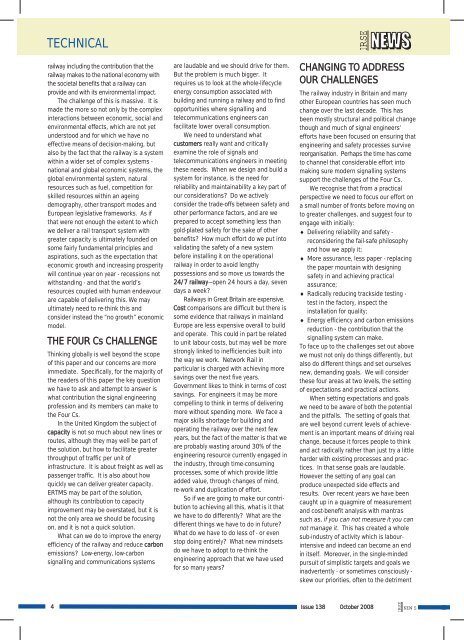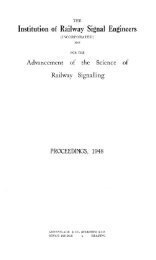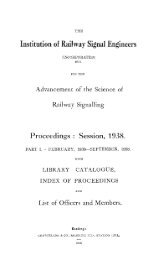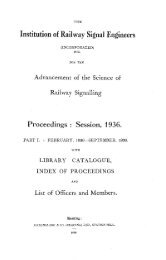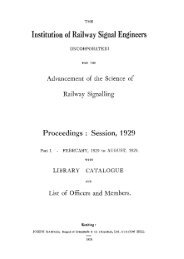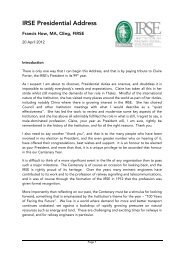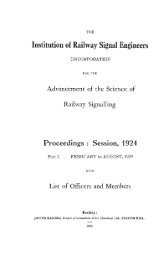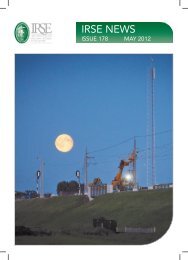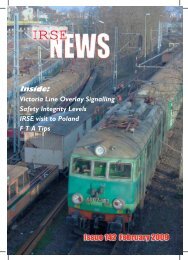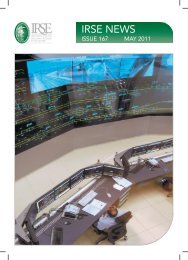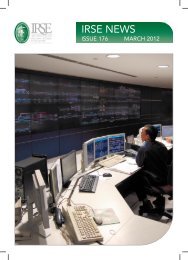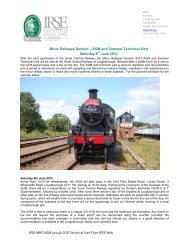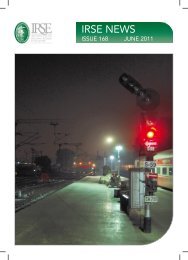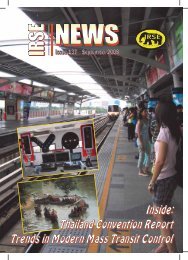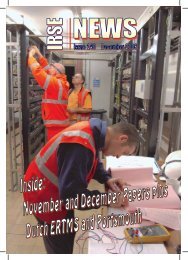IRSE News 138 Oct 08.pdf
IRSE News 138 Oct 08.pdf
IRSE News 138 Oct 08.pdf
Create successful ePaper yourself
Turn your PDF publications into a flip-book with our unique Google optimized e-Paper software.
TECHNICAL<br />
railway including the contribution that the<br />
railway makes to the national economy with<br />
the societal benefits that a railway can<br />
provide and with its environmental impact.<br />
The challenge of this is massive. It is<br />
made the more so not only by the complex<br />
interactions between economic, social and<br />
environmental effects, which are not yet<br />
understood and for which we have no<br />
effective means of decision-making, but<br />
also by the fact that the railway is a system<br />
within a wider set of complex systems -<br />
national and global economic systems, the<br />
global environmental system, natural<br />
resources such as fuel, competition for<br />
skilled resources within an ageing<br />
demography, other transport modes and<br />
European legislative frameworks. As if<br />
that were not enough the extent to which<br />
we deliver a rail transport system with<br />
greater capacity is ultimately founded on<br />
some fairly fundamental principles and<br />
aspirations, such as the expectation that<br />
economic growth and increasing prosperity<br />
will continue year on year - recessions not<br />
withstanding - and that the world’s<br />
resources coupled with human endeavour<br />
are capable of delivering this. We may<br />
ultimately need to re-think this and<br />
consider instead the “no growth” economic<br />
model.<br />
THE FOUR Cs CHALLENGE<br />
Thinking globally is well beyond the scope<br />
of this paper and our concerns are more<br />
immediate. Specifically, for the majority of<br />
the readers of this paper the key question<br />
we have to ask and attempt to answer is<br />
what contribution the signal engineering<br />
profession and its members can make to<br />
the Four Cs.<br />
In the United Kingdom the subject of<br />
capacity is not so much about new lines or<br />
routes, although they may well be part of<br />
the solution, but how to facilitate greater<br />
throughput of traffic per unit of<br />
infrastructure. It is about freight as well as<br />
passenger traffic. It is also about how<br />
quickly we can deliver greater capacity.<br />
ERTMS may be part of the solution,<br />
although its contribution to capacity<br />
improvement may be overstated, but it is<br />
not the only area we should be focusing<br />
on, and it is not a quick solution.<br />
What can we do to improve the energy<br />
efficiency of the railway and reduce carbon<br />
emissions? Low-energy, low-carbon<br />
signalling and communications systems<br />
are laudable and we should drive for them.<br />
But the problem is much bigger. It<br />
requires us to look at the whole-lifecycle<br />
energy consumption associated with<br />
building and running a railway and to find<br />
opportunities where signalling and<br />
telecommunications engineers can<br />
facilitate lower overall consumption.<br />
We need to understand what<br />
customers really want and critically<br />
examine the role of signals and<br />
telecommunications engineers in meeting<br />
these needs. When we design and build a<br />
system for instance, is the need for<br />
reliability and maintainability a key part of<br />
our considerations? Do we actively<br />
consider the trade-offs between safety and<br />
other performance factors, and are we<br />
prepared to accept something less than<br />
gold-plated safety for the sake of other<br />
benefits? How much effort do we put into<br />
validating the safety of a new system<br />
before installing it on the operational<br />
railway in order to avoid lengthy<br />
possessions and so move us towards the<br />
24/7 railway—open 24 hours a day, seven<br />
days a week?<br />
Railways in Great Britain are expensive.<br />
Cost comparisons are difficult but there is<br />
some evidence that railways in mainland<br />
Europe are less expensive overall to build<br />
and operate. This could in part be related<br />
to unit labour costs, but may well be more<br />
strongly linked to inefficiencies built into<br />
the way we work. Network Rail in<br />
particular is charged with achieving more<br />
savings over the next five years.<br />
Government likes to think in terms of cost<br />
savings. For engineers it may be more<br />
compelling to think in terms of delivering<br />
more without spending more. We face a<br />
major skills shortage for building and<br />
operating the railway over the next few<br />
years, but the fact of the matter is that we<br />
are probably wasting around 30% of the<br />
engineering resource currently engaged in<br />
the industry, through time-consuming<br />
processes, some of which provide little<br />
added value, through changes of mind,<br />
re-work and duplication of effort.<br />
So if we are going to make our contribution<br />
to achieving all this, what is it that<br />
we have to do differently? What are the<br />
different things we have to do in future?<br />
What do we have to do less of - or even<br />
stop doing entirely? What new mindsets<br />
do we have to adopt to re-think the<br />
engineering approach that we have used<br />
for so many years?<br />
<strong>IRSE</strong><br />
CHANGING TO ADDRESS<br />
OUR CHALLENGES<br />
The railway industry in Britain and many<br />
other European countries has seen much<br />
change over the last decade. This has<br />
been mostly structural and political change<br />
though and much of signal engineers’<br />
efforts have been focused on ensuring that<br />
engineering and safety processes survive<br />
reorganisation. Perhaps the time has come<br />
to channel that considerable effort into<br />
making sure modern signalling systems<br />
support the challenges of the Four Cs.<br />
We recognise that from a practical<br />
perspective we need to focus our effort on<br />
a small number of fronts before moving on<br />
to greater challenges, and suggest four to<br />
engage with initially:<br />
Delivering reliability and safety -<br />
reconsidering the fail-safe philosophy<br />
and how we apply it;<br />
More assurance, less paper - replacing<br />
the paper mountain with designing<br />
safety in and achieving practical<br />
assurance;<br />
Radically reducing trackside testing -<br />
test in the factory, inspect the<br />
installation for quality;<br />
Energy efficiency and carbon emissions<br />
reduction - the contribution that the<br />
signalling system can make.<br />
To face up to the challenges set out above<br />
we must not only do things differently, but<br />
also do different things and set ourselves<br />
new, demanding goals. We will consider<br />
these four areas at two levels, the setting<br />
of expectations and practical actions.<br />
When setting expectations and goals<br />
we need to be aware of both the potential<br />
and the pitfalls. The setting of goals that<br />
are well beyond current levels of achievement<br />
is an important means of driving real<br />
change, because it forces people to think<br />
and act radically rather than just try a little<br />
harder with existing processes and practices.<br />
In that sense goals are laudable.<br />
However the setting of any goal can<br />
produce unexpected side effects and<br />
results. Over recent years we have been<br />
caught up in a quagmire of measurement<br />
and cost-benefit analysis with mantras<br />
such as, if you can not measure it you can<br />
not manage it. This has created a whole<br />
sub-industry of activity which is labourintensive<br />
and indeed can become an end<br />
in itself. Moreover, in the single-minded<br />
pursuit of simplistic targets and goals we<br />
inadvertently - or sometimes consciously -<br />
skew our priorities, often to the detriment<br />
4<br />
Issue <strong>138</strong> <strong>Oct</strong>ober 2008<br />
<strong>IRSE</strong><br />
NEWS


